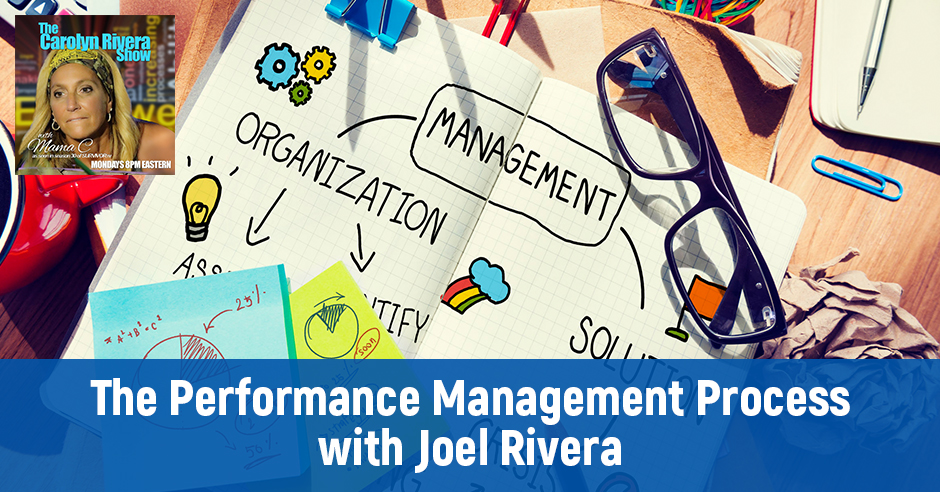
A company is only as good as the people in it. This means that for managers, it is their duty to keep the employees on track. One of the great methods that could help is performance management. It is the past, present, and the future. It evaluates the people on how they performed as well as how they are doing against the goals that have been set. Taking us deeper into that from the HR perspective is Human Resource professional Joel Rivera. Joel brings to the table his experiences in talking to managers, employees, and companies; giving a 360-viewpoint of the performance management process. Join us and learn how you can properly improve employee performance and know the measures of being a good evaluator and manager.
—
Listen to the podcast here:
The Performance Management Process with Joel Rivera
We talked about the interviewing process on the last episode because many of you realize that at the end of the year, two things happen. Either places and companies are hiring because they’ve got to get rid of their budget or they’re getting ready to hire because they’re getting a brand-new budget in January. It does spark the job openings in December. We talked about interviewing skills and the interviewing process. For so many people, the interviewing process is so stressful because you don’t know what to expect. Everyone interviews in their own way and typically the challenge when you’re looking for a job is, “How do I wow them? How do I differentiate myself from all the others that are applying because I only get this one shot, this first impression?” That’s a make it or break it. First impressions are super powerful. Many times, people don’t realize how powerful they are. The interview process is important and you have to plan, you have to prepare and you have to come up with the questions that you think that they’re going to ask you, based on the job description in front of you.
You have the job description. Use it to your advantage. What we talked about, which was the biggest takeaway was to follow the STAR process. The STAR process is your way of getting yourself prepared ahead of time. The S stands for situation. Think about what your company was going through as you’re beginning to answer questions using the STAR process. S is the situation. You talk about what your company was going through, what was the culture and things like that. The T stands for task. What was the task that you are linking that question to? What was the task that you had? What were the goals and objectives? What were you supposed to accomplish? The A is for action. What action did you take to achieve your goals? The R stands for results, which what was the outcome. Did you achieve your goals? Were you able to meet the objective? When you’re in an interview, you’re not going to pick a scenario that you did not achieve the goal.
Make sure you select the right scenarios that link back to the job that you’re applying for. Those are the critical elements. It’s that time of the year and that’s what we talked about. There are other things that are important as we look towards this time of the year and what specifically happens in some companies. I’m going to talk about something that always or typically happens in this time of the year. I’m working with a company and I will be delivering this information to them up in Boston. This is a discussion that you are not going to want to miss. The topic is performance management. This is one of those corporate buzzwords that people talk about. Let me define it for you. Performance management encompasses so many different things, all focused on ensuring that employees are aligned with the organization. They understand how to do their jobs and they get feedback. They know exactly how they’re doing throughout the year. It all starts with the hiring process. We talked about interviewing skills.
When people are hired, their job needs to be clearly defined for them and then it continues through evaluating their work. There are steps in the middle and you have to link all this together because people are looking to continuously develop. They’re looking to be motivated to do a good job and you have to get them engaged. Your employees need to be able to stay focused, to feel connected to the company and to want. The keyword there is want to do a good job. Statistics show that only 21% of employees feel that the performance management process motivates them to do a good job. That is pretty scary. When I read that statistic, I was stunned because that means that 79% of the people working are not motivated to do a great job. Their performance management process where they work does not work for them. They’re not motivated to go above and beyond. Maybe they don’t feel like they’re valued in their company.
First impressions are super powerful. Click To TweetMaybe they don’t feel like their manager cares about them. Maybe they don’t feel like they have the right skills and don’t know how to ask for it. Whatever the case is, we need to listen and learn because that means that there are a whole lot of unhappy people out there in the workforce. Whether you’re the unhappy employee or you’re the unhappy manager, you can take action, you can make changes to at least be part of that 21% figure it out. This performance management topic starts with outlining your goals and objectives. Not only for you personally, if you’re a manager you have to do that for all of your employees. I talked a bit about this a while back when I was sharing how people create their own personal vision. You develop your goals and objectives, you think about what it is that you want to accomplish and how long is it going to take you to do that? If you want more in-depth information about getting goals, objectives and figuring out how to create those goals and objectives, you can look in my book, Plant Your Flag: The Seven Secrets to Winning.
I have all the information that you need about goals, objectives and creating a vision. The topic is all about performance management. It includes providing timely and specific feedback so that people know how they’re doing but it doesn’t stop there. It includes motivating people and providing them with development opportunities so that they can continue to improve, to learn and to grow. What’s typically left out in a performance management process as well is recognition. This is a huge topic that we can go on and on, we’re not going to do a deep dive into recognition. We will at some point because it’s that important. Performance management, in a nutshell, includes goal setting, evaluating, how you’re doing against those goals and recognizing people when they do. The one part in this process that people dread the most is the performance appraisal. Most of us when we are thinking about the performance management process, we think about it because HR is telling us, “It’s time for you to get together with your people, set up a meeting and write their performance appraisal.”
Managers typically hate that process because for them they’re thinking, “What am I going to do? What am I going to write? Did I keep good records so I know exactly what I’m supposed to tell this person?” What happens if you don’t keep good records is that whatever you remember throughout the year is what you remember, back to that perception. Back to that, “What I think I saw?” The performance management process is critical. Every HR department around the globe focuses on performance management because that’s the way you evaluate your employee base. Because of that, I wanted to have someone who has an HR background.

It so happens that I happen to be married to somebody who has been in the HR space for several years. My husband, Joel Rivera, his viewpoint is seeing it from the HR perspective. What that brings to the table is he talks to the managers, he talks to employees, he talks to the company. He’s looking at it from a 360 viewpoint because he’s seeing it from all sides. We’re going to be talking about the performance management process. From an HR perspective, when you think of performance management, what does it mean to you from an HR standpoint?
It’s a time or opportunity to do employee feedback, clearly define useful feedback. Most of all from an employee’s standpoint, you have to answer a couple of questions in terms of what the employee wants. From an employee standpoint, the employee wants to know what am I supposed to be doing throughout the year. How well am I required to do it? What are the standards? What’s your culture? In addition, what do you think of my performance? At that point you’re rewarding and you’re recognizing it. The more important is how well can I wait? One of the challenges with the performance appraisal is that it’s attached to the compensation. It’s attached to two to a merit increase. We all know compensation is emotional. It’s an emotional subject. One of the things that as a manager you’ve got to focus and concentrate on is how can you tell this employee how can they improve? Everybody wants to know how can they do better. It’s focused on the past, it is focused on the present and it’s focused on the future.
That’s a great way to think of it. When people think about it, it is focused on the past because what you’re talking about is what they have done throughout the year. How does that link back to their goals and objectives? You’re talking about the present because you’re having that discussion and you’re sharing with them what you saw and what you think they can do to get better. The future is how is my job changing? Is it changing? What do I need to do differently to be more effective? I love when you talk about it from the past, the present and the future so that our audience can think about it in those terms. That’s a great way of sharing that data with them. Thank you.
The appraisal’s a one-time event, it’s a one-day event when you’re talking to your employees. It’s a process. One of the key things that any manager should know about this one-day event is that it shouldn’t come as a surprise to the employee in terms of how they’re being rated. If the employee is surprised about their rating or about their evaluation, you haven’t done your job as a manager. Throughout the year you need to be coaching, counseling, giving tons of useful feedback. That should enable you to let the employee know how exactly where they stand throughout the process. If they’re surprised, if they’re shocked by their rating or increase, you haven’t done a good job as a manager.
One of the biggest things to consider as a manager is how frequently are you checking in with your employees? How frequently are you providing them feedback throughout the year to ensure that there are no surprises? I’m sure that probably in your career because I know that I’ve seen it in mine, that there were some instances where there were surprises along the way. When that happens, you clearly become part of that 79%. You will not be satisfied. You will not be motivated to do a good job because you were surprised by that rating. That’s not a great place to be. Not only to be surprised by the rating but what you should also know is that you shouldn’t be bringing things up at the appraisal time that you haven’t discussed throughout the year in terms of what you saw. One time I was actually sitting with a couple of peer managers. We were talking about all of the people that reported to us and then having an open, honest discussion on how these employees were doing.
Everybody wants to know how can they do better. Click To TweetI was giving them examples of how I thought my person was doing and all the things that they’ve accomplished, linking it back to the goals and objectives, all the specifics of what they accomplished throughout the year. This manager sitting across from me said, “Let me give you some feedback.” It’s December and they’re giving me feedback on something that my employee did to them in June. I was pretty upset because I’m like, “If this happened in June, it’s December, why am I hearing this for the first time?” It does happen. I’m sure you have examples as well, where surprises do take place and it’s not something that is very good because then what do you have to do? You have to go back to the employee and say, “By the way, in June I heard that this happened.” That discussion can’t be something that’s good. Do you have any examples in that area as well or what?
I remember getting an evaluation where I totally was surprised. It was basically based on maybe not the manager’s fault totally but the system that we were using. It was a full-rated scale starting from unsatisfactory all the way through excellent. There was four and two in between. When I got my ratings, I was rated fair. I was rated fair, which in my mind was not too great. I objected to it but the manager said, “You’re a new employee. A lot of new employees don’t get rated higher than fair.” I was totally surprised, totally shocked, I thought it was unfair. The funny part was that after the appraisal was done, I did write a little narrative saying that I disagree with the rating. Every time I saw this manager and then he would ask me how I was doing, I would as always reply I’m fair. Every time from then on, whenever we saw each other, which was quite frequently, “How are you doing Joel?” “I’m fair. Thank you for asking.” That was my first experience with a manager that in my eyes wasn’t so experienced in doing appraisals. He wasn’t prepared, he wasn’t experienced and he surprised me. That wasn’t a good experience.
It doesn’t even have to be new to the company. New people, whether they’re new to the company or they’re taking on a new role, sometimes they are given these lower ratings because of company standards. It makes you part of that 21% that’s not engaged at work, not happy and not motivated. The other thing that we talked about is that at times, companies put these processes in place that says, “You can’t be rated higher than a certain rating because you’re new. There’s no possible way that you can learn everything there is to learn about your job in that short period of time.” There are so many different performance appraisal systems that are used. There’s the one to five scale.
Most of the companies that I’ve worked with deal with the one to five scale. One could either be not performing or it could be exceeding performance but it doesn’t matter. It goes from one to five. When you are in the midst of that discussion, what typically happens is nobody’s listening to what you’re saying. All they want to know is what the number is. It links back to their compensation. That’s the advantage/disadvantage of that system. There are some companies that are actually doing away with the numbers and they’re focusing on what people have done. What are your thoughts on eliminating the numbers from the performance appraisal?

It’s a good idea. More companies are going away from that. In the appraisal system basically, it’s a match to the company culture. When I explain in terms of before, being fair this was a utility company. Utility companies are basically very conservative. Throughout my career, I don’t think I’ve ever joined an organization where I see the same appraisal process. I’m familiar with the 360 process, with the employee self-assessment, with the behavioral, anchors, graphic ratings, NBOs. I’m starting to hear about the 720 process. It’s basically the 360, where you include your manager, yourself and colleagues. Organizations are expanding that a step further and they’re going to a 720, where they’re actually talking to customers. The customers have input in terms of your appraisal, which I think is a good idea and most of you see this over the sales organizations. As organizations have changed and they want the talent, the organizations are constantly reinventing what works for them and what doesn’t work for them. Unfortunately, a lot of times there’s a number attached to it. Who wants to be rated a two unless two is great? Who wants to be rated a one? It’s attached to compensation, it’s an emotional issue.
I love the fact that companies are bringing in the customers because the bottom line is without them, you don’t have a company. The fact that they can weigh in on how the company’s employees are doing, I think it’s a great process as well. It adds an additional monkey wrench into getting it all done and collecting the data. Having that data is very effective because it links back to exactly how they’re doing.
A lot of companies now want to be in tune with the customer experience. That’s a valuable piece of feedback for employees. You could be doing a great job but if you’re leaving bodies on the road, that’s not such a great thing. That’s why a lot of these companies, especially sales organizations are including the customer because they want to know what the customer experience is like from an employee standpoint.
If you think about all the different companies that are out there like a bank, for example, every single bank offers the same stuff. There’s nothing different and it’s not sexy. It’s not like, “I’ve got this fabulous checking account and look what it does.” It doesn’t do anything and you can’t touch it. The only differentiator that those types of companies have are their employees. The employees are the differentiator. If you get the feedback from the customers, then you know whether those employees are providing that fabulous customer experience or not. I agree 100% with getting that customer feedback, it is a differentiator. We talked about the buckets, those numbers. I was actually in a company that eliminated the numbers.
Without customers, you won’t have a company. Click To TweetPeople could figure it out because if you were rated a three, for example, everyone knew that the percentage raise that you would get links to a three if it was this amount or it links to a four if it was this amount. It helped a little bit. People were not so focused on the number. The other thing that you can do in that instance is to separate out the discussion from the discussion of the merit increase. I’ve seen companies do that as well, where we’re going to talk about your performance and how you did past, present, future, all of that. We’re going to schedule another meeting to talk through at a different time, how that links back to your merit increase. That could be a way to separate the two a little bit.
That’s a good point because it helps when you do separate the discussions. One, you’re focused on your performance, what you need to do, what you’ve done, talking about the process throughout the year. When you break that up and you have another merit discussion, the conversation is way easier from a manager’s standpoint and both from an employee standpoint. One of the best performance appraisals I ever got was when I worked for this public utility company. The International Brotherhood of Electrical Workers went on strike. Unbeknownst to me, when they went on strike, the management was supposed to take on their jobs, not totally but to fill in. My crew was assigned on the ground lines, the sewer system where there were electrical lines that go through the sewer systems and it was maintenance work. It was me, my manager and two other people and they happened to go out for lunch because we were rotating. I was three weeks away from our appraisal and he says, “We’re waiting for the electricity to go down, it should be shut off so we can do with maintenance.” He said, “Since we have a couple of minutes, let’s talk about your performance appraisal.” It was unique because it was a conversation. It was a two-way conversation.
It was an exchange of ideas. This man went through the entire year with me, he didn’t have a paper and he wrote his notes on a napkin. What he did was he was very clear and succinct in terms of, “Here’s what we discussed when you were first hired. We wrote down goals. We looked at your performance.” He was open to the conversations and he kept writing things on a napkin. I agree with everything he said. There was no discussion about compensations, it was about performance against goals. It was about recognition. It was about, “How could I improve and development in terms of what I need from you and how can I help you?” When it was over, it was maybe a 45-minute discussion but I look back at it and I’m like, “In the sewer, in twelve inches of water, in work boots and hardhats.” I looked back at it and I’m like, “That was probably one of the best appraisals that I ever got.” Not in terms of the merit but in terms of the conversation. It doesn’t matter where you are, the key is the exchange of ideas and the conversation.
We talked about how people get focused on the number. One of the things that you can do is separate that discussion. Separate the feedback against goals, objectives from the actual number and how much money they’re going to get. That’s what people are typically looking for. I don’t know about you but I have had instances throughout my career where I’ve come to a new company, I’ve taken on a new department for me but these people have been in that department for a while. This one company in particular, I was working with individuals for years rated very highly. Once a five, always a five. Some organizations actually, if you get that high rating one time that’s the way people think of you and you’re always rated that high. I had an individual where he was rated high. I came in from the outside and I was evaluating his performance throughout the year.

I didn’t think that he was a five. A five to me is somebody who takes initiative to complete all of their goals and objectives, looks for ways to help add value in other departments or other areas. Not just focusing on what they do because if you focus on what you do and you do it well to me, that’s part of your job. I had to rate this particular gentleman differently and to me, I didn’t rate him bad. I rated him as a solid performer, meets and sometimes exceeds his objectives. You would have thought that I cut off his right arm because he was not happy at all. In some instances, this happens and I’m sure being an HR, you’ve had to deal with this. How do you coach, either the employee or the manager to be able to handle that situation? I’m sure it happens frequently.
Specifically, when an employee disagrees with your ratings, that should not happen. One of the things that a lot of companies do, it’s part of becoming a manager or supervisor is to train managers on how to conduct appraisals, not just a one-day event. It’s the process of documenting performance. Writing down notes in the journal, things of that nature to help alleviate that situation. One of the most important things in appraisals or why appraisals are done is to document performance, to have a legally defensible process where you could defend yourself against quick cases. I was working for a top ten newspaper in the country and we were charged with doing an analysis in a particular unit, copy editors and newspaper have a lot of copy editors. This particular department, we did a discriminate analysis where we take all the appraisals and basically break them down through agenda, who’s getting what.
We found out we have 60% females, 40% males in this one division. The average rating for females is 3.9, which is great. The average male rating was something like 4.3. There were more females than males but the males average almost 2% higher merit increases. Unbeknownst to anyone, unless we did that analysis and we said, “What’s wrong here?” We would’ve never found out. We determined that one reason was who was rating these employees? 85% of the managers were males and they were rating their counterparts way higher, even though some of the females were rated almost 2% higher in their performance.
That highlights the fact that you have to take your career and even the appraisal process. If you’re a manager in a company, you’re thinking to yourself, “What am I going to do? What am I going to write down for all my employees? I hope I kept good notes. I hope I had those discussions throughout the year.” I hope you did too. I hope you’re not giving anyone surprises. If you’re the employee, they did that survey and they found out that the women were rated pretty okay but not as high as the men. They didn’t get as much of a raise as the men. As an employee, you need to take ownership of your career. You need to take ownership of the appraisal process and for those feedback discussions throughout the year.
The more specific you can get in your feedback, the better off you are. Click To TweetLet’s say you’re an employee and your manager isn’t scheduling significant feedback, enough feedback or constantly keeping in tune with what you’re doing, it’s your responsibility to make that happen. If you don’t, who else will? Don’t be a victim. Don’t wait until the end of the year and say, “My manager sucks. They never gave me this information. It’s now a surprise, I hate my manager and I hate my rating.” Don’t get hung up on the number either. Focus on what you’re accomplishing, what you can do to constantly succeed, to learn and grow. It’s up to you.
If you’re a manager, be a good manager, focus on being specific. I know that there are times when you don’t know what to write. The more specific you can get in your feedback, the better off you are. If you say, “My employee is fabulous,” what does fabulous mean? It doesn’t mean anything or it means something different to so many people. I want to say thank you, Joel, for sharing your insight. Your several years of HR experience was very helpful in the discussion on performance management. We’ve had some great discussions to have you take that time, make some notes, make sure you’re focusing on those things that you need to.
Performance management, management in general, is all about great communication. Communication is the way in which people get things done. It is so important to really make sure that you focus on your communication skills because that’s going to make it or break it for you. I want you to take with you, have those performance discussions, make sure they’re specific, make sure there are no surprises. Focus on the performance management process. As a tip, I would say separate out that performance discussion from the merit increase. Remember this show is all about you, the audience. Follow me, share with me some feedback, tell me what you want to talk about. I love to talk about these topics. Anything that can help you to improve because my passion is to watch people succeed. Helping people achieve more than they ever thought possible is what I am focused on.
Important Links:
About Joel Rivera
 Joel Rivera is a Certified Senior Human Resources Professional with 25 years experience in Human Resource Management, Compensation and Benefits Planning, Talent Management, Organizational Development and Employee Relations. Joel recently concluded an international assignment in Asia where he led a Human Resources function for a $100 Million global call center management company. He has also been recruited to strategically overhaul the Human Resource function of 2 of the top 10 largest newspapers. Joel is an accomplished HR executive with Strategic, Operational and Administrative expertise. He received his B.S. in Education from Queens College.
Joel Rivera is a Certified Senior Human Resources Professional with 25 years experience in Human Resource Management, Compensation and Benefits Planning, Talent Management, Organizational Development and Employee Relations. Joel recently concluded an international assignment in Asia where he led a Human Resources function for a $100 Million global call center management company. He has also been recruited to strategically overhaul the Human Resource function of 2 of the top 10 largest newspapers. Joel is an accomplished HR executive with Strategic, Operational and Administrative expertise. He received his B.S. in Education from Queens College.